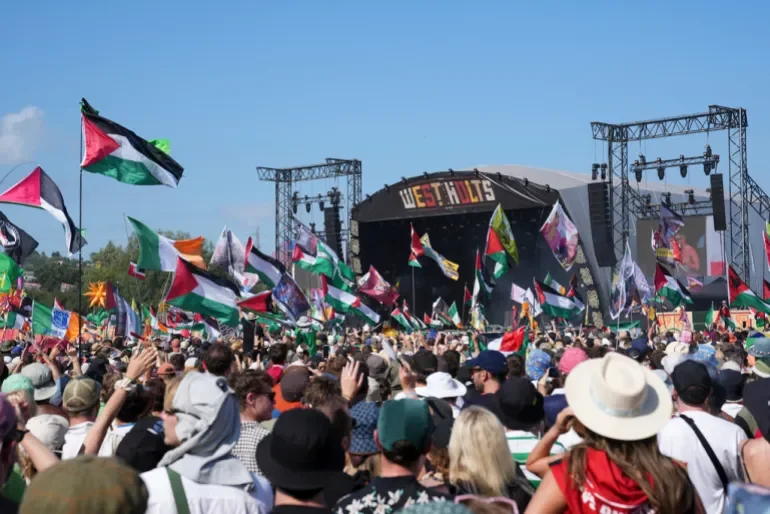The Gaza Effect
Over the past 2 years, festivals and concerts have transformed into safe spaces for venting frustration and showing solidarity with Palestine. More than half of the gigs we’ve attended this year have featured tributes to Gaza, met with rapturous audience applause every time. Pro-Palestinian sentiment has become part of the show, and pro-Israel stickers are completely absent from the toilet walls of independent grassroots venues across the UK.
Kneecap’s high-profile stand at Coachella placed a target on their backs, triggering intense backlash from Zionist-owned media outlets and genocidal political pundits. The uproar was swift, with old gig footage dredged up to paint them as dangerous radicals. Several of Kneecap’s upcoming shows were cancelled as the tabloids, and even the Prime Minister, hounded festival organisers to drop the group. Despite the pressure, Kneecap remained defiant.
And more importantly, so did their fans.
The trio’s Glastonbury set saw such an enormous crowd turn out that festival staff had to shut access to the stage 45 minutes before they performed, with the crowd erupting with loud boos at pre-show video montage of TV personalities scolding the band. Kneecap said the outrage directed at them was a “transparent effort to derail” discussion of Israel’s actions.
Legendary trip-hop outfit Massive Attack issued public statements pushing back and defending Kneecap, having spoken out about Palestine for over 30 years. In July, they launched an alliance of musicians aiming to protect artists from intimidation and organised censorship, alluding to legal harassment by groups like UK Lawyers for Israel, and within days, a roster of well-known acts including Fontaines D.C., Brian Eno, Garbage, and, of course, Kneecap signed on in support. This sends the message that an injury to one outspoken artist is felt by us all, and the wider music community will band together to defend their principles.
Earlier in the year, over 300 public figures including Wolf Alice, Primal Scream, Dua Lipa, Annie Lennox and many others co-signed an open letter demanding a halt to UK arms sales to Israel and immediate aid access. Roger Waters has been championing the Palestinian cause for decades, denouncing Israel’s occupation and incorporating pro-Palestine imagery into his concert tours long before it was common, remaining undeterred by the slander campaign against him. In June 2024 he headlined a sold-out benefit concert in London for Palestine alongside Yusuf Islam (Cat Stevens) and rapper Lowkey, and has also risked legal consequences by publicly supporting Palestine Action, calling it a “great organisation” as the UK government outlawed the group and labelled them terrorists. Paul Weller of The Jam has curated two star-studded benefit concerts in London featuring Primal Scream, Paloma Faith, and Kneecap, with all proceeds going to medical aid for Palestine, as well as DJing alongside members of The Clash, The Specials and Madness at fundraisers.
Political engagement is the new normal at concerts.
Fans now chant “Free, Free Palestine” and wave Palestine flags the way they used to twirl glowsticks, and a Kneecap show has become an opportunity to transform feelings of helplessness and rage at the daily news into a Massive Cathartic Attack. People need outlets to express their anguish and solidarity, and packed festival fields are providing that outlet. When tens of thousands roar “Free, Free Palestine” there’s a release of emotion and a sense of shared purpose that gives deeper meaning to their festival memories, and attendees who would rather not engage with the issue are going to find the atmosphere increasingly hostile to their neutrality. Silence is embarrassing, and fans now expect their favourite artists to take a stand, or at least show some empathy. Apathy is very uncool.
Musicians who support Israel have been rightly met with protests, calls for boycotts, social media outrage, and hostile receptions at concerts. In 2017, Radiohead went ahead with a concert in Tel Aviv despite public pressure from Roger Waters, Ken Loach, and BDS activists, and since October 7th Radiohead’s members have been continually under fire for not joining the cultural boycott. Nick Cave’s stance on Israel puts him at odds with his peers Waters and Eno, but it’s David Draiman who has faced the most visible public backlash, being met with audible boos as he took the stage at Black Sabbath’s Back To The Beginning tribute concert. This was likely due to him posting an image of himself in Israel signing an IDF bomb to social media. Draiman posted a statement calling the hecklers ‘Jew hating morons’, stressing that he remains ‘unapologetically, fiercely pro-Israel’. He is now a pariah and a meme.
Pro-Palestine displays have not dampened the mood at festivals and concerts, they’ve enhanced it. There’s a sense of relief for artists that can incorporate their conscience into their art without rejection, scorn and backlash, with fans cheering them on. Shared chants and stickers foster a real sense of community among strangers. Even the BBC ended up hosting the recording of Kneecap’s Glastonbury set on iPlayer, acknowledging the public demand. Police investigations into Kneecap and Bob Vylan have largely fizzled out without charges, with authorities reluctant to actually prosecute musicians for political speech that the public overwhelmingly supports.
The Gaza Effect speaks to a broader shift. Festivals like Woodstock have historically been sites of anti-war protest, and today’s events are reviving that legacy in the context of Palestine. Standing up against an ongoing genocide is just part of being a decent human being, and the music world is up in arms. From venues plastered with little BDS stickers, to stadiums echoing with slogans in solidarity, the message is loud and clear.

